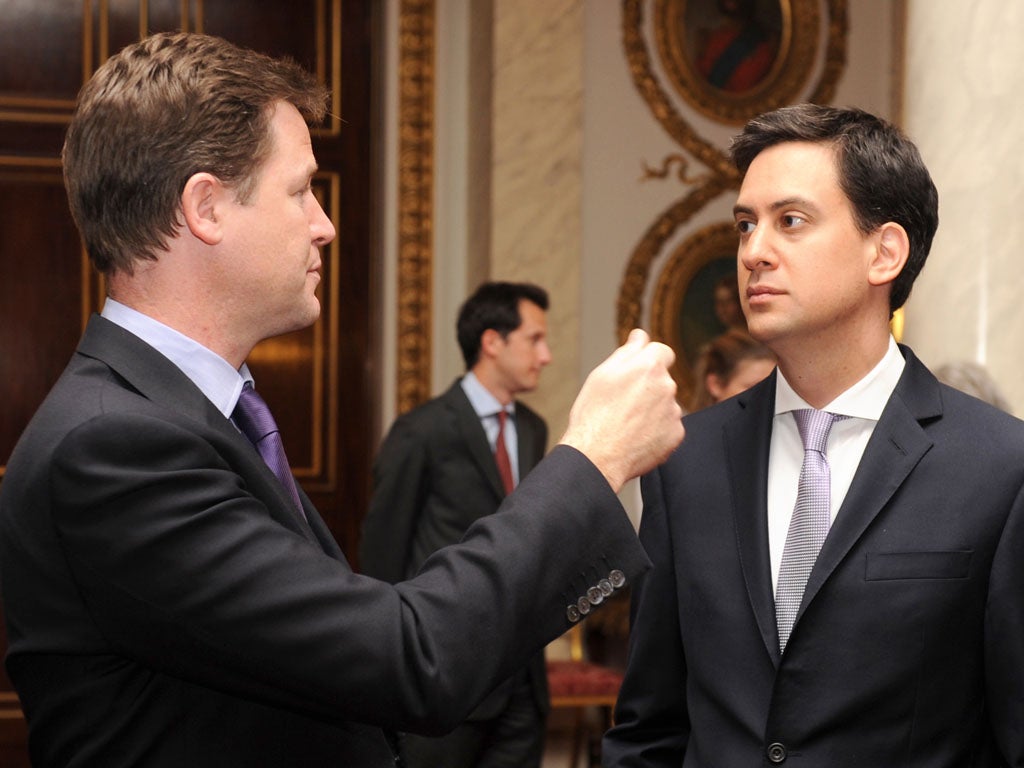A Lib-Lab Coalition could be back on - if only Nick Clegg and Ed Miliband can bear to bury the hatchet
David Cameron's offer of an In/Out referendum both reduces the chance of a future Tory-Lib coalition and the likelihood of a Tory majority government

Labour and the Liberal Democrats are back in it together. They share a common discomfort from David Cameron’s Europe speech; they would love to defend the European cause, but see in it only electoral heartache. Yet, as he basks in the initial right-wing and Eurosceptic euphoria, the Prime Minister will see that he has inadvertently created political space for the other two main parties. Might this week’s events help to revive the so-called progressive alliance that was shattered in May 2010?
I should not get carried away. There is a long list of hypotheticals to get through; there is considerable bad blood between the parties and their leaders that would require the work of expert medics and shrinks to allay.
Of all the obstacles, three stand out: first, Labour neither wants nor expects Nick Clegg to be Lib Dem leader by the time of the 2015 election. The man who said he would not negotiate unless Gordon Brown was removed is now, Labour loyalists proclaim, getting his comeuppance. They might, however, have to live with him.
Second, on the issue that has defined this Government – the recession and the austerity “remedy” – the parties are divided by policy and language. The Lib Dems have talked incessantly about clearing up Labour’s “mess”, blaming almost all our woes on the performance of the previous administration. It would be hard for either side to kiss and make up without losing face.
Rapprochement
Third come the tactics required in a British general election. Parties have to be seen to be tearing each other apart, without even a hint at the subsequent compromises that coalition requires. Ed Miliband is confident he can pick off Lib Dems in the south. He wants the third party’s voters, not its goodwill.
As for Clegg, he faces a unique bind. He has to work with Cameron until 2015. He can, and should, continue to advocate distinct Lib Dem policies and messages, but he cannot be seen to be equal in distance from the other two parties. He is in bed with one, not the other. And yet…
The beginnings of a rapprochement between Clegg and Miliband are plain to see. The most important recent development has been the draining of the poison from the rhetoric. The two men have met several times, as have their senior aides, most recently when they found that their responses to the Leveson Inquiry more or less chimed. Meanwhile, earlier this month, Tory and Lib Dems went their separate ways in the Lords voting lobby, as Clegg and Miliband instructed their peers to delay boundary changes for at least another parliamentary term.
So how far will this go? Miliband has still to make up his mind. He has spent the past two years consolidating his leadership, an unexpected and clear achievement. One of the paradoxes of this parliament is the discipline shown by Labour and Lib Dem backbenchers, leaving it to the Conservatives to tear themselves apart.
Miliband has yet to decide whether Labour remains an old-fashioned tribal entity or whether it truly wishes to embrace a broader centre-left consensus. It has dabbled at this in the past – talking to the Lib Dems and to the Greens, from time to time, playing service to non-partisan civil society groups – but never shown conviction.
The wizened MPs on the right of the Labour Party find the very idea anathema. Many from the 2010 intake have taken a more relaxed view. After hinting at a more “liberal” approach during the leadership contest, Miliband has allowed himself to be convinced that he has nothing to gain electorally from embracing civil liberties or going “soft” on crime and punishment. Some senior Labour figures are uncomfortable with this.
Courage and calculation
Theresa May’s plans for universal internet surveillance – the “snoopers’ charter” – may provide Miliband and Clegg with an opportunity for further collaboration. Although her bill was seen off by a disparaging parliamentary report, the Home Secretary appears determined to reintroduce similar measures after a few months’ grace. Cameron, already fighting battles on several fronts, is unlikely to stand in her way. This could prove an intriguing battle, as is the environment, with the Tories having largely given up on a green agenda.
Trident might also fall into this category. Danny Alexander, the Treasury Secretary, who has taken over his party’s consideration of alternatives to the submarine nuclear programme, made clear earlier this week that the UK does not need to find a “like-for-like” replacement. Labour has clung to the line that no expense should be spared – even up to a staggering £100bn – to keep Britain “safe”. But with everyone espousing the need for financial rigour, could there be an opening there?
These decisions boil down to political courage, as well as calculation. By refusing immediately to endorse Cameron’s in/out Europe referendum, Miliband has put himself closer to Clegg, a man who, until recently, he could hardly be in the same room with. Are these alliances pure coincidence? Or are tentative roots being put down? The honest answer is they don’t know yet; but at least they are pondering their options.
Join our commenting forum
Join thought-provoking conversations, follow other Independent readers and see their replies
Comments
Bookmark popover
Removed from bookmarks